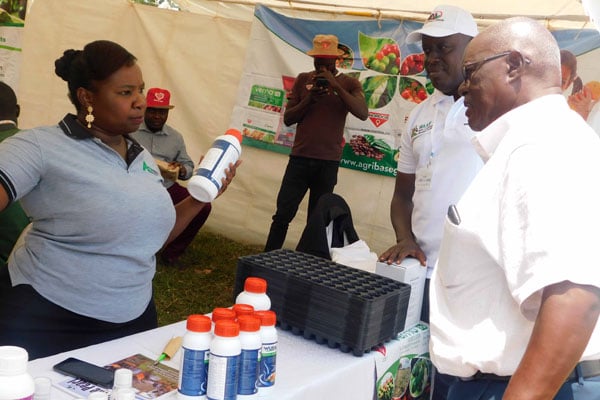Prime
Farmers bemoan coffee thieves

Gerald Ssendaula, former minister of Finance and prominent coffee farmer (right) at one of the demonstration stalls during International Coffee Day . PHOTO/michael j ssali
What you need to know:
- During the celebrations to mark the International Coffee Day, farmers complained about theft of coffee from their gardens, which they claim leads them to harvesting premature coffee cherries.
Celebrations to mark International Coffee Day where held at the farm of a prominent coffee farmer, Fred Luzinda, at Nkuke Village, Buwunga Sub-county, Masaka District.
The function whose theme was, “A celebration of Robusta and the greater Masaka coffees” attracted hundreds of coffee farmers and other stakeholders from across the country.
Dr Emmanuel Iyamulemye, managing director of Uganda Coffee Development Authority (UCDA), said that the function was held in greater Masaka because the region is located on the western shores of Lake Victoria, which happens to be the birth place of Robusta coffees.
Greater Masaka region in which 266,281 households grow coffee, according to UCDA, is made up of nine districts --- Bukomansimbi, Kalangala, Kalungu, Kyotera, Lwengo, Lyantonde, Masaka, Rakai, and Ssembabule.
Coffee promotion
Iyamulemye paid special tribute to Katikkiro Charles Peter Mayiga and the Kingdom of Buganda for promoting coffee farming. He also used the occasion to present a coffee export licence to Buganda’s Mwanyi Terimba Limited, which he handed over to Katikkiro.
Chief Whip, Hamson Obua represented government at the function which was also attended by religious leaders, members of Parliament, coffee exporters, and farmers. He said that given coffee’s big potential to reduce poverty, the government is now working on strategies to spread coffee growing to all regions of the country.
“Wherever I have travelled throughout the region I have seen many modern buildings surrounded by coffee gardens, and this is what we want to see in all parts of Uganda,” says Obua.
Benefits of coffee
Katikkiro Mayiga outlined the health benefits of drinking coffee and urged all coffee farmers to drink coffee. He said there is no medical evidence to associate such health issues such as high blood pressure with coffee drinking. He caused laughter when he told the gathering, “Not even is it true that drinking coffee causes drought among women wherever they live. Nor does coffee lead to loss of sleep. I drink coffee myself every evening but I sleep like a baby.”
He also urged all youth with some land to plant coffee without any fear that it takes too long to bring returns. “Cloned Robusta coffee takes just months to begin flowering. There is a beginning for everything. Only the other day I became Katikkiro and it is now 10 years since it happened. Bishop Severus Jumba, seated right here, was consecrated about three years ago and he is now fully established in his service,” said Mayiga.
Challenges
Fred Luzinda, who owns more than 300 acres of coffee, read out a document detailing the challenges that coffee stakeholders in the region face. He said, “UCDA estimates the current annual yield per tree to be around 1.7 kilogrammes of Fair Average Quality (FAQ/Kase)and the target is to increase it to 2.2 kilogrammes through good agricultural practices by stumping of old trees and use of fertilisers,” the document read. “We wish as a sub-region to share with you the following challenges that work against achieving the targeted increased production and productivity.”
According to the document that Luzinda read, the farmers say that the high cost and often poor quality of tools, fertilisers and agricultural chemicals are a big burden and hindrance to the farmer.
The farmers also complain about the lack of soil testing kits that could enable them to better assess the fertility rate of the soil in their coffee shambas and to assist them in choosing the type of fertilisers to use. The farmers also have challenges with the high cost of tarpaulins yet they must use them for drying the harvested coffee cherries.
The other challenge is the mushrooming of coffee nurseries which are not monitored and many of which sell poor quality seedlings to farmers. “Certified mother gardens and nurseries ought to be established nearest to the coffee farmers as much as possible i.e. at parish level,” the coffee stakeholders suggest.
The farmers demand that more agricultural services extension officers be deployed so that the farmers get more exposed to good agricultural practices and more efficient pest control measures.
They mention the increasing need to regulate harvesting and post-harvesting practices in order to safeguard coffee quality.
Theft of coffee in gardens
The coffee stakeholders in the Greater Masaka Sub-region complain about theft of coffee from their gardens, which they claim leads them to harvesting premature coffee cherries. “We need to establish farmer level organisations to facilitate training, provision of the limited extension services, provision of crop finance, warehousing and collective marketing facilities for better prices and quality management,” said Luzinda.
The farmers also demanded a strong law to regulate internal marketing and to enforce quality standards of handling and transporting coffee. They also want licensing and training of traders to check malpractices. They also want strong laws to regulate and enforce quality standards at hulling factories. The other demand is the revival of wet processing of Masaka Robusta coffees the way and at the level it was done in the 1960s.




